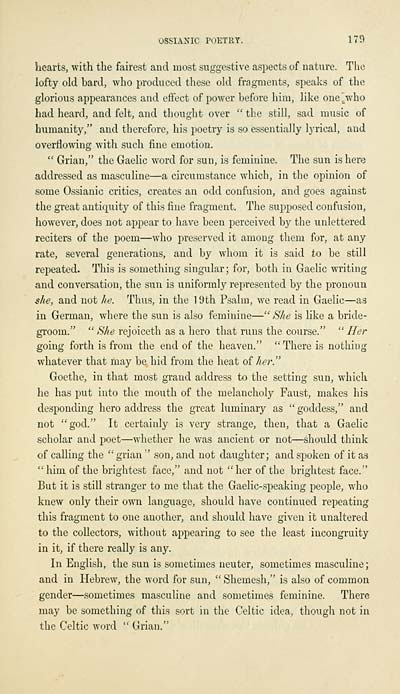Download files
Complete book:
Individual page:
Thumbnail gallery: Grid view | List view

OSSIANIC POETRY. 170
liearts, with the fairest and most suggestive aspects of nature. The
lofty old bard, who produced these oki fragments, speaks of the
glorious appearances and eiFect of power before him, like one [.who
had heard, and felt, and thought over " the still, sad music of
humanity," and therefore, his poetry is so essentially lyrical, and
overflowing with such fine emotion.
" Grian," the Gaelic word for sun, is feminine. The sun is here
addressed as masculine — a circumstance which, in the opinion of
some Ossianic critics, creates an odd confusion, and goes against
the great antiquity of this fine fragment. The supposed confusion,
however, does not appear to have been perceived by the unlettered
reciters of the poem — who preserved it among them for, at any
rate, several generations, and by whom it is said to be still
repeated. This is something singular; for, both in Gaelic writing
and conversation, the sun is uniformly represented by the pronoun
she, and not he. Thus, in the 1 9th Psalm, we read in Gaelic — as
in German, where the sun is also feminine — '"' She is like a bride-
groom." " She rejoiceth as a hero that runs the course." "Her
going forth is from the end of the heaven." "There is nothiug
whatever that may be hid from the heat of her."
Goethe, in that most grand address to the setting sun, which
he has put into the mouth of the melancholy Faust, makes his
desponding hero address the great luminary as " goddess," and
not "god." It certainly is very strange, then, that a Gaelic
scholar and poet — whether he was ancient or not — should think
of calling the " grian " son, and not daughter; and spoken of it as
"him of the brightest face," and not "her of the brightest face."
But it is still stranger to me that the Gaelic-speaking people, who
knew only their own language, should have continued repeating
this fragment to one another, and should have given it unaltered
to the collectors, without appearing to see the least incongruity
in it, if there really is any.
In English, the sun is sometimes neuter, sometimes masculine;
and in Hebrew, the word for sun, " Shemesh," is also of common
gender — sometimes masculine and sometimes feminine. There
may be something of this sort in the Celtic idea, though not in
the Celtic word " Grian,"
liearts, with the fairest and most suggestive aspects of nature. The
lofty old bard, who produced these oki fragments, speaks of the
glorious appearances and eiFect of power before him, like one [.who
had heard, and felt, and thought over " the still, sad music of
humanity," and therefore, his poetry is so essentially lyrical, and
overflowing with such fine emotion.
" Grian," the Gaelic word for sun, is feminine. The sun is here
addressed as masculine — a circumstance which, in the opinion of
some Ossianic critics, creates an odd confusion, and goes against
the great antiquity of this fine fragment. The supposed confusion,
however, does not appear to have been perceived by the unlettered
reciters of the poem — who preserved it among them for, at any
rate, several generations, and by whom it is said to be still
repeated. This is something singular; for, both in Gaelic writing
and conversation, the sun is uniformly represented by the pronoun
she, and not he. Thus, in the 1 9th Psalm, we read in Gaelic — as
in German, where the sun is also feminine — '"' She is like a bride-
groom." " She rejoiceth as a hero that runs the course." "Her
going forth is from the end of the heaven." "There is nothiug
whatever that may be hid from the heat of her."
Goethe, in that most grand address to the setting sun, which
he has put into the mouth of the melancholy Faust, makes his
desponding hero address the great luminary as " goddess," and
not "god." It certainly is very strange, then, that a Gaelic
scholar and poet — whether he was ancient or not — should think
of calling the " grian " son, and not daughter; and spoken of it as
"him of the brightest face," and not "her of the brightest face."
But it is still stranger to me that the Gaelic-speaking people, who
knew only their own language, should have continued repeating
this fragment to one another, and should have given it unaltered
to the collectors, without appearing to see the least incongruity
in it, if there really is any.
In English, the sun is sometimes neuter, sometimes masculine;
and in Hebrew, the word for sun, " Shemesh," is also of common
gender — sometimes masculine and sometimes feminine. There
may be something of this sort in the Celtic idea, though not in
the Celtic word " Grian,"
Set display mode to: Large image | Transcription
Images and transcriptions on this page, including medium image downloads, may be used under the Creative Commons Attribution 4.0 International Licence unless otherwise stated. ![]()
| Early Gaelic Book Collections > Ossian Collection > Selections from the Gaelic bards > (203) |
|---|
| Permanent URL | https://digital.nls.uk/78072507 |
|---|
| Description | Selected books from the Ossian Collection of 327 volumes, originally assembled by J. Norman Methven of Perth. Different editions and translations of James MacPherson's epic poem 'Ossian', some with a map of the 'Kingdom of Connor'. Also secondary material relating to Ossianic poetry and the Ossian controversy. |
|---|
| Description | Selected items from five 'Special and Named Printed Collections'. Includes books in Gaelic and other Celtic languages, works about the Gaels, their languages, literature, culture and history. |
|---|

